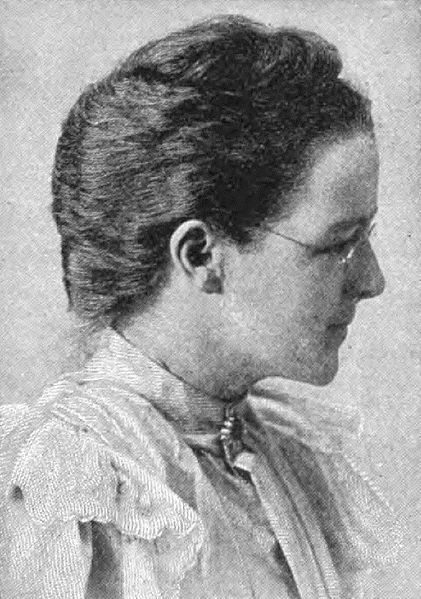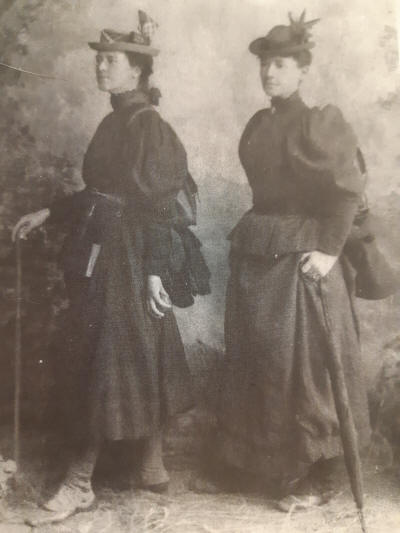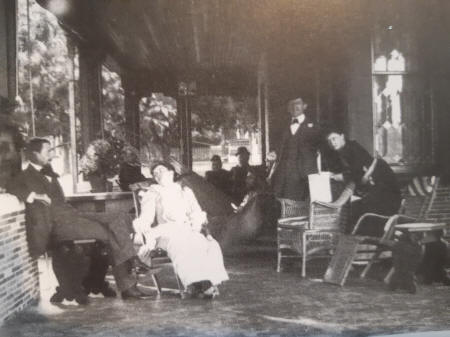

Queer Places:
38 Vista Ave, Auburndale, MA 02466
Wolvercote Cemetery, 447 Banbury Rd, Oxford OX2 8EE, Regno Unito
 Louise
Imogen Guiney (January 17, 1861 – November 2, 1920) was an American poet,
essayist and editor, born in Roxbury, Massachusetts.
Louise
Imogen Guiney (January 17, 1861 – November 2, 1920) was an American poet,
essayist and editor, born in Roxbury, Massachusetts.
The Visionist believed in "art for art's sake" and in the nobility of artistic production over all other activities. Prominent Visionists were Herbert Copeland, Louise Imogen Guiney, Ralph Adams Cram, photographer and publisher F. Holland Day, poet Philip Savage and writer Alice Brown. Louise Imogen Guiney enjoyed a friendship with Alice Brown of which many, including F. Holland Day (Brown's neighbor on Beacon Hill) were jealous. In her affectionate biography of "Lou", Alice Brown reminisces: "You could hardly imagine her, at any age, without her girl's grace, her mystic smile. A long-legged romp in petticoats far beyond the milestones when childhood is apt to slink away abashed before oncoming desires and dignities, she was early in love with the sweet seduction of books and equally with gay adventure out of doors."
The daughter of Gen. Patrick R. Guiney, an Irish-born American Civil War officer and lawyer,[1] and Jeannette Margaret Doyle, she was raised as a Christian and educated at a convent school and in Providence, Rhode Island, from which she graduated in 1879.
Over the next 20 years, she worked at various jobs, including serving as a postmistress and working in the field of cataloging at the Boston Public Library. She was a member of several literary and social clubs, and according to her friend Ralph Adams Cram was "the most vital and creative personal influence" on their circle of writers and artists in Boston[2].
Louise Guiney had a Boston marriage with Alice Brown. However, Guiney was Catholic and had been educated in a convent school in Providence which meant she could never move as easily in Boston society as upper-class Protestant lesbians. So deep was the anti-Catholic bigotry of the age that when Guiney took a job as a postmaster in Newton, Protestant neighbors boycotted buying stamps from her, a serious move given that her pay depended on her volume of sales. Seeking to prevent her from falling into poverty, Guiney's friends organized a campaign to send people from Boston to Newton to buy stamps from her. Guiney, never healthy, went on to work at the Boston Public Library and provided part time editorial and secretarial assistance to the publishing house of her friend, F. Holland Day. In time Guiney began to publish her poetry and developed a small but dedicated following. While she achieved modest success and became friendly with some of the LGBTQ community in Boston and its straight literary social circles, she grew frustated and moved to England. Guiney's lover, Alice Brown, was a prolific writer, publishing over 20 novels in addition to short stories, poems, and magazine articles. She moved to Boston in 1881 where she began her romance with Guiney. When Guiney moved to England, Brown was a frequent visitor and the two collaborated on a biography of Robert Louis Stevenson. She was also very private, ordering her personal papers to be burned upon her death.

Guiney and Brown

Visionist Copeland, Guiney, Cram and Brown on the veranda of the Day
mansion in Norwood, 1892
In 1901, Guiney moved to Oxford, England, to focus on her poetry and essay writing. She soon began to suffer from illness and was no longer able to write poetry, instead concentrating on critical and biographical studies of Catholic poets and writers.
Guiney died of a stroke near Gloucestershire, England, at age 59, leaving much of her work unfinished.[3]
My published books: